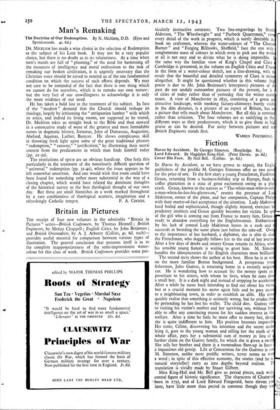Man's Remaking
The Doctrine of Our Redemption. By N. Micklem, D.D. (Eyre and Spottiswoode. 4s. 641.) DR. MIcKLEm has made a wise choice in the selection of Redemption as the subject of his Lent book. It may not be a very popular choice, but there is no doubt as to its salutariness. At a tune when men's minds are full of "planning," of the need for harnessing all the resources of intelligence and moral enthusiasm to the task of remaking our broken civilisation, it is urgently necessary that the Christian voice should be raised to remind us of the one fundamental condition on which the success of such efforts depends. We may not care to be reminded of the fact that there is one thing which we cannot do for ourselves, which is to remake our own nature: but the very fact of our unwillingness to acknowledge it is only the more evidence of our need.
He has taken a bold line in the treatment of his subject. In face of the " modern " demand that the Church should reshape its theology, largely by jettisoning the "antiquarian lumber" with which its attics and indeed its living rooms, are supposed ,to be stored,
Dr. Micklem takes us straight back to the Bible and then onward in a consecutive study of some of the greatest and most formidable names in dogmatic history, Irenaeus, John of Damascus, Augustine, Abelard, Aquinas, Luther, Bunyan. He shows conspicuous skill in throwing fresh light upon some of the great traditional phrases "redemption," "ransom," " justification " by illustrating their moral content from the predicament in which man finds himgelf today (pp. 21-30). The restrictions of space are an obvious handicap. One feels this particularly in the treatment of the notoriously difficult question of " universal " redemption (pp. 31-40), where the issue appears to be left somewhat uncertain. And one would wish that room could have been found for something rather more substantial in the way of a closing chapter, which would have related the dominant thoughts of the historical survey to the best theological thought of our own day. But these are small blemishes in a work marked throughout by a rare combination of theological acumen, imagination and a


























 Previous page
Previous page